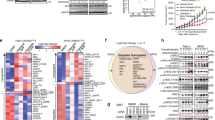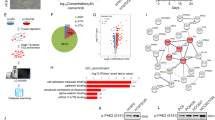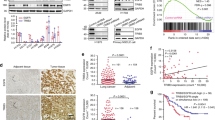Abstract
Cetuximab (Erbitux) is an anti-epidermal growth factor receptor (EGFR) monoclonal antibody whose activity is related to the inhibition of EGFR downstream signaling pathways. P53 and phosphatase and tensin homologue deleted on chromosome 10 (PTEN) have been reported to control the functionality of PI3K/AKT signaling. In this study we evaluated whether reintroducing P53 using non-viral gene transfer enhances PTEN-mediated inhibition of PI3K/AKT signaling by cetuximab in PC3 prostate adenocarcinoma cell line bearing p53 and pten mutations. Signaling phosphoproteins expression was analyzed using Bio-Plex phosphoprotein array and western blot. Apoptosis induction was evaluated from BAX expression, caspase-3 activation and DNA fragmentation analyses. The results presented show that p53 and pten gene transfer additionally mediated cell growth inhibition and apoptosis induction by restoral of signaling functionality, which enabled the control of PI3K/AKT and MAPKinase signaling pathways by cetuximab in PC3 cells. These results highlight the interest of the analysis of signaling phosphoproteins expression as molecular predictive markers for response to cetuximab and show that p53 and pten mutations could be key determinants of cell response to cetuximab through the functional impact of these mutations on cell signaling.
This is a preview of subscription content, access via your institution
Access options
Subscribe to this journal
Receive 12 print issues and online access
$259.00 per year
only $21.58 per issue
Buy this article
- Purchase on Springer Link
- Instant access to full article PDF
Prices may be subject to local taxes which are calculated during checkout







Similar content being viewed by others
References
Mendelsohn J, Baselga J . The EGF receptor family as targets for cancer therapy. Oncogene 2000; 19: 6550–6565.
Prewett M, Rockwell P, Rockwell RF, Giorgio NA, Mendelsohn J, Scher HI et al. The biologic effects of C225, a chimeric monoclonal antibody to the EGFR, on human prostate carcinoma. J Immunother Emphasis Tumor Immunol 1996; 19: 419–427.
Sirotnak FM, Zakowski MF, Miller VA, Scher HI, Kris MG . Efficacy of cytotoxic agents against human tumor xenografts is markedly enhanced by coadministration of ZD1839 (Iressa), an inhibitor of EGFR tyrosine kinase. Clin Cancer Res 2000; 6: 4885–4892.
Yarden Y . The EGFR family and its ligands in human cancer: signaling mechanisms and therapeutic opportunities. Eur J Cancer 2001; 37 (Suppl 4): S3–S8.
Lei W, Mayotte JE, Levitt ML . Enhancement of chemosensitivity and programmed cell death by tyrosine kinase inhibitors correlates with EGFR expression in non-small cell lung cancer cells. Anticancer Res 1999; 19: 221–228.
Fukuoka M, Yano S, Giaccone G, Tamura T, Nakagawa K, Douillard JY et al. Multi-institutional randomized phase II trial of gefitinib for previously treated patients with advanced non-small-cell lung cancer. J Clin Oncol 2003; 21: 2237–2246.
Herbst RS . Review of epidermal growth factor receptor biology. Int J Radiat Oncol Biol Phys 2004; 59: 21–26.
Brooks JD, Bova GS, Ewing CM, Piantadosi S, Carter BS, Robinson JC et al. An uncertain role for p53 gene alterations in human prostate cancers. Cancer Res 1996; 56: 3814–3822.
Lebedeva IV, Su ZZ, Sarkar D, Fisher PB . Restoring apoptosis as a strategy for cancer gene therapy: focus on p53 and mda-7. Semin Cancer Biol 2003; 13: 169–178.
Rho JK, Choi YJ, Ryoo BY, Na II, Yang SH, Kim CH et al. p53 enhances gefitinib-induced growth inhibition and apoptosis by regulation of Fas in non-small cell lung cancer. Cancer Res 2007; 67: 1163–1169.
Huether A, Höpfner M, Baradari V, Schuppan D, Scherübl H . EGFR blockade by cetuximab alone or as combination therapy for growth control of hepatocellular cancer. Biochem Pharmacol 2005; 70: 1568–1578.
Singh B, Reddy PG, Goberdhan A, Walsh C, Dao S, Ngai I et al. p53 regulates cell survival by inhibiting PIK3CA in squamous cell carcinomas. Genes Dev 2002; 16: 984–993.
Kalra N, Seth K, Prasad S, Singh M, Pant AB, Shukla Y et al. Theaflavins induced apoptosis of LNCaP cells is mediated through induction of p53, down-regulation of NF-kappa B and mitogen-activated protein kinases pathways. Life Sci 2007; 80: 2137–2146.
Li J, Yen C, Liaw D, Bose S, Wang SI, Puc J et al. PTEN, a putative protein tyrosine phosphatase gene mutated in human brain, breast, and prostate cancer. Science 1997; 275: 1943–1947.
McMenamin ME, Soung P, Perera S, Kaplan I, Loda M, Sellers WR . Loss of PTEN expression in paraffin-embedded primary prostate cancer correlates with high Gleason score and advanced stage. Clin Cancer Res 1999; 59: 4291–4296.
Maehama T, Dixon JE . The tumor suppressor, PTEN/MMAC1, dephosphorylates the lipid second messenger, phosphatidylinositol 3,4,5-trisphosphate. J Biol Chem 1998; 273: 13375–13378.
Stambolic V, Suzuki A, de la Pompa JL, Brothers GM, Mirtsos C, Sasaki T et al. Negative regulation of PKB/AKT-dependent cell survival by the tumor suppressor PTEN. Cell 1998; 95: 29–39.
Frattini M, Saletti P, Romagnani E, Martin V, Molinari F, Ghisletta M et al. PTEN loss of expression predicts cetuximab efficacy in metastatic colorectal cancer patients. Br J Cancer 2007; 97: 1139–1145.
She QB, Solit D, Basso A, Moasser MM . Resistance to gefitinib in PTEN-null HER-overexpressing tumor cells can be overcome through restoration of PTEN function or pharmacologic modulation of constitutive phosphatidylinositol 3′-kinase/AKT pathway signalling. Cancer Res 2003; 9: 4340–4346.
Ndoye A, Bouali S, Dolivet G, Leroux A, Erbacher P, Behr JP et al. Sustained gene transfer and enhanced cell death following glucosylated-PEI-mediated p53 gene transfer with photochemical internalisation in p53-mutated head and neck carcinoma cells. Int J Oncol 2004; 25: 1575–1581.
Maurice-Duelli A, Ndoye A, Bouali S, Leroux A, Merlin JL . Enhanced cell growth inhibition following PTEN nonviral gene transfer using polyethylenimine and photochemical internalization in endometrial cancer cells. Technol Cancer Res Treat 2004; 3: 459–465.
Ndoye A, Dolivet G, Hogset A, Leroux A, Fifre A, Erbacher P et al. Eradication of p53-mutated head and neck squamous cell carcinoma xenografts using nonviral p53 gene therapy and photochemical internalization. Mol Ther 2006; 13: 1156–1162.
Logan IR, McNeill HV, Cook S, Lu X, Lunec J, Robson CN . Analysis of the MDM2 antagonist nutlin-3 in human prostate cancer cells. Prostate 2007; 67: 900–906.
Sharrard RM, Maitland NJ . Phenotypic effects of overexpression of the MMAC1 gene in prostate epithelial cells. Br J Cancer 2000; 83: 1102–1109.
Li X, Luwor R, Lu Y, Liang K, Fan Z . Enhancement of antitumor activity of the anti-EGF receptor monoclonal antibody cetuximab/C225 by perifosine in PTEN-deficient cancer cells. Oncogene 2006; 25: 525–535.
Merlin JL, Dolivet G, Dubessy C, Festor E, Parache RM, Verneuil L et al. Improvement of nonviral p53 gene transfer in human carcinoma cells using glucosylated polyethylenimine derivatives. Cancer Gene Ther 2001; 8: 203–210.
Ndoye A, Merlin JL, Leroux A, Dolivet G, Erbacher P, Behr JP et al. Enhanced gene transfer and cell death following p53 gene transfer using photochemical internalisation of glucosylated PEI-DNA complexes. J Gene Med 2004; 6: 884–894.
Astanehe A, Arenillas D, Wasserman WW, Leung PC, Dunn SE, Davies BR et al. Mechanisms underlying p53 regulation of PIK3CA transcription in ovarian surface epithelium and in ovarian cancer. J Cell Sci 2008; 121: 664–674.
Davies MA, Kim SJ, Parikh NU, Dong Z, Bucana CD, Gallick GE . Adenoviral-mediated expression of MMAC/PTEN inhibits proliferation and metastasis of human prostate cancer cells. Clin Cancer Res 2002; 8: 1904–1914.
McCubrey JA, Steelman LS, Chappell WH, Abrams SL, Wong EW, Chang F et al. Roles of the Raf/MEK/ERK pathway in cell growth, malignant transformation and drug resistance. Biochim Biophys Acta 2007; 1773: 1263–1284.
Tanaka H, Fujita N, Tsuruo T . 3-Phosphoinositide-dependent protein kinase-1-mediated IkappaB kinase beta (IkkB) phosphorylation activates NF-kappaB signaling. J Biol Chem 2005; 280: 40965–40973.
Lièvre A, Bachet JB, Le Corre D, Boige V, Landi B, Emile JF et al. KRAS mutation status is predictive of response to cetuximab therapy in colorectal cancer. Cancer Res 2006; 66: 3992–3995.
Merlin JL, Genin P, Harle A, Giacometti G, Chergui F, Bouali S et al. Phosphoprotein array in tumor biopsies for molecular diagnosis of PI3 Kinase and MAP Kinase signaling functionality. Mol Cancer Ther 2007; 6: 3540s.
Merlin JL, Longavenne E, Chergui F, Ramacci C, Rouyer M, Bouali S et al. Exploring human epidermal growth factor receptors downstream signaling by multiplex phosphoprotein determination in breast cancer. Proc Amer Assoc Cancer Res 2006; 47 Abstract 3607.
Merlin JL, Mriouah J, Dolivet G, Ramacci C, Rouyer M, Genin P et al. Signaling phosphoproteins in head and neck squamous cell carcinoma: relation with cellular sensitivity to cetuximab and interest of multiplex determination using Bio-Plex protein array. Proc Amer Assoc Cancer Res 2007; 48 Abstract 185.
Merlin JL, Perkins G, Lièvre A, Ramacci C, Emile J, Boige V et al. Additional value of EGFR downstream signaling phosphoprotein expression to KRAS mutation for response prediction to cetuximab in colorectal cancer. J Clin Oncol 2008; 26: 209s.
Vattemi E, Claudio PP . Adenoviral gene therapy in head and neck cancer. Drug News Perspect 2006; 19: 329–337.
Acknowledgements
This study was supported by grants from the French Ligue Nationale Contre le Cancer and Alexis Vautrin Cancer Center private research funds.
Author information
Authors and Affiliations
Corresponding author
Rights and permissions
About this article
Cite this article
Bouali, S., Chrétien, AS., Ramacci, C. et al. P53 and PTEN expression contribute to the inhibition of EGFR downstream signaling pathway by cetuximab. Cancer Gene Ther 16, 498–507 (2009). https://doi.org/10.1038/cgt.2008.100
Received:
Revised:
Accepted:
Published:
Issue Date:
DOI: https://doi.org/10.1038/cgt.2008.100



